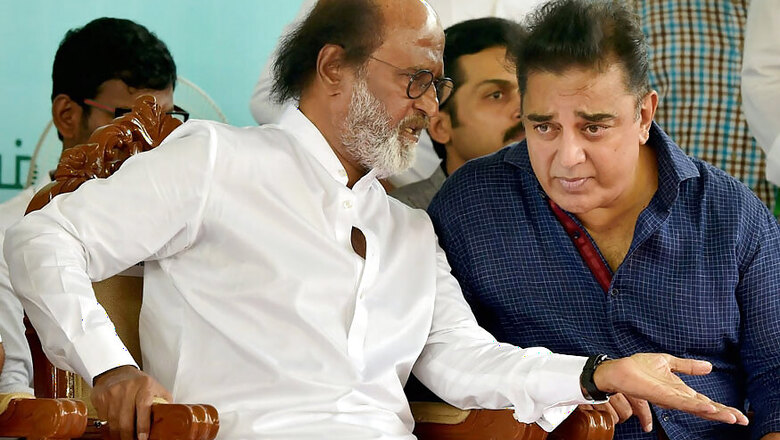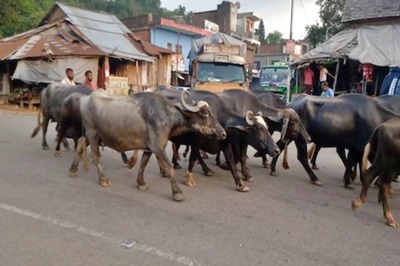
views
Tamil film stars Rajinikanth and Kamal Haasan have ignited TV studios and social media political debate with their statement that they could come together politically “in the interest of Tamil Nadu if required”.
Apart from their fans and television studios, the ruling All India Anna Dravida Munnetra Kazhagam (AIADMK) dispensation in Tamil Nadu also seems excited with its ostensible criticism of the two superstars.
Chief minister E Palaniswamy declared that the two stars will meet the same political fate that legendary actor Sivaji Ganesan met with. (Sivaji Ganesan and AIADMK founder M.G.Ramachandran (MGR) were two powerful poles in the Tamil cinema from the 1950s to the 1970s, but while MGR succeeded as a political superstar, Sivaji, known as a more talented actor, failed to make a major mark in politics.)
In contrast to the AIADMK, the opposition DMK seems to be more calibrated in its criticism of the two stars and, like other political forces in the state, seems keen to not hype the two stars by attacking them.
This AIADMK offensive may actually help bolster the political presence of the two stars as opponents of the ruling dispensation and thereby splitting the opposition space occupied firmly by the DMK.
In fact, all through the parliamentary election in 2019, Kamal Haasan remained a fierce critic of the BJP and the AIADMK. He has been consistent in his ideological opposition to Hindutva and has positioned as a left-of-centre political figure. This is the same political space occupied by the DMK.
On the other hand, Rajinikanth has not declared a clear ideological position with his self-professed “spiritual politics”. He seems to have an affinity towards the BJP and the BJP clearly seems to have a great liking for Rajinikanth.
Put this together with the fact that the AIADMK is a BJP ally and the E Palaniswamy regime has survived primarily due to the backing of the centre over the last two years, it raises a suspicion of a possible tacit understanding, with a devious calculation, between the stars and the ruling dispensation.
The BJP by itself has failed to make any impact in Tamil Nadu. In fact, it was a drain on the AIADMK in the parliamentary elections.
Unlike in most other parts of the country, Prime Minister Narendra Modi has a very poor appeal in Tamil Nadu and when the debate is polarised between the BJP and its opponents, it benefits the opposition.
This may find further evidence in the fact that the AIADMK managed to hold some of the seats in the by polls to 22 assembly seats, but faced almost a total washout in terms of parliamentary seats in the simultaneous polls in 2019.
Given this situation, the BJP may have to look at a different image and a devious strategy to have an impact in Tamil Nadu politics. At the moment, it is riding on the AIADMK and hence would back any effort that could bolster the AIADMK’s chance in the next assembly poll in the state, schedule to take place in 2021.
The only way it can boost the AIADMK is by supporting the creation of an alternative third force. Certainly, if the third force can defeat both Dravidian parties and break the dichotomy in the state then that would be a dream come true for the national party, but the stars, together or separately, do not seem to have the ability to do that and hence the next best thing for them would be to become a third force that can dent the opposition space.
But can the two stars bring “miracle change” in Tamil Nadu, separately or together?
When a nationally lesser known star Vijayakanth launched his party and contested the 2006 assembly elections, against both J.Jayalalithaa and M.Karunanidhi, he polled more than 8 per cent vote on his own.
In contrast, Haasan’s party’s debut in 2019 parliamentary elections got him only around 3.7 per cent votes. In fact, a party led by film director Seeman, known for extreme language and ideology, emerged as a marginally bigger force in terms of vote share in the state.
Rajinikanth is yet to even launch his own party. While he certainly has greater mass appeal than Haasan, he is yet to make any strong grassroots political impact.
Given their ideological contradictions and the fact that their personas have run rival to each other on the screen for decades, it’s not clear what kind of “togetherness” the two of them can bring about.
While Tamil Nadu has a history of two film stars, M.G.Ramachandran and J.Jayalalithaa, rising to be chief ministers, it must be pointed out that both of them did not succeed overnight and certainly not just because of their stardom.
They had a political narrative, experience and fought a bitter grassroots battle to succeed. Being a star may help, but it does not guarantee political success.
At the moment Haasan and Rajini do not seem to have anything more than explosive statements and there is no evidence to suggest that they can bring about a “miracle change”, together or separately.




















Comments
0 comment